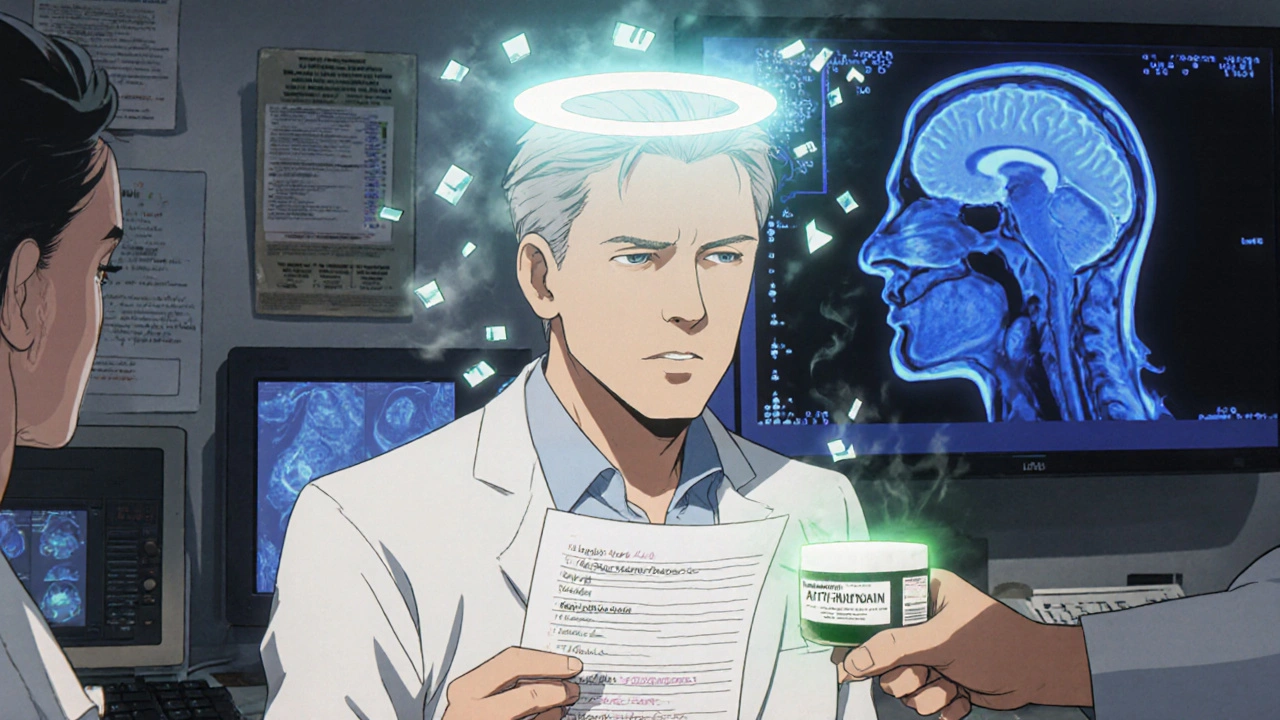Why You Might Be Forgetting Things After Starting a New Medication
You started a new pill-maybe for sleep, pain, or anxiety-and now you’re struggling to remember where you put your keys, what you had for breakfast, or even why you walked into a room. It’s not just stress. It’s not aging. It’s your medication.
Thousands of people experience this every year. It’s not rare. It’s not all in your head. Medications like Benadryl, Ambien, Xanax, and even some painkillers can directly interfere with how your brain forms and retrieves memories. The good news? These changes are usually reversible. You don’t have to live with brain fog just because your doctor prescribed it.
Which Medications Are Most Likely to Cause Brain Fog?
Not all drugs affect your mind the same way. Some are far more likely to cause memory issues than others. The biggest culprits fall into a few key categories.
- Anticholinergic drugs: These block acetylcholine, a brain chemical critical for memory and focus. Common examples include diphenhydramine (Benadryl, Tylenol PM), oxybutynin (Ditropan), and tricyclic antidepressants like amitriptyline. Research shows people taking these have up to a 4.5 times higher risk of memory problems. Even over-the-counter sleep aids can be dangerous if used regularly.
- Benzodiazepines and sleep hypnotics: Xanax, lorazepam, Ambien, and zopiclone reduce activity in the hippocampus-the brain’s memory center. Studies using fMRI show these drugs can cut memory transfer from short-term to long-term storage by 30%. Ambien users report memory gaps in 15% of cases, far more than older benzodiazepines.
- Opioids: Oxycodone, hydrocodone, and codeine activate receptors in the medial temporal lobe, disrupting working memory. At standard doses, they can reduce your ability to hold information in mind by 25%. Immediate-release forms hit harder than extended-release versions.
- Chemotherapy drugs: Known as "chemo brain," this affects up to 75% of cancer patients. It’s not just fatigue-it’s trouble focusing, slower thinking, and forgetfulness that can last months or years after treatment ends.
- Corticosteroids: Prednisone and similar drugs can cause sudden confusion, disorientation, and mood swings, especially at doses above 20mg/day. Symptoms often appear within days of starting.
Even some antidepressants and seizure meds carry a risk. SSRIs like sertraline have a lower impact than older tricyclics, but still show a measurable increase in memory complaints. Newer drugs like isotretinoin (for acne) and ciclosporin (for autoimmune conditions) are also flagged in studies.
How to Tell If It’s Your Medication-or Something Worse
Brain fog from drugs feels different from dementia or Alzheimer’s. The key difference? Speed and reversibility.
If your memory problems started within days or weeks of beginning a new medication-and you didn’t have issues before-it’s likely drug-related. Alzheimer’s creeps in slowly over years. Medication-induced fog often hits hard and fast: forgetting conversations, blanking on names, losing track of time.
Also, if your symptoms improve within a week or two after stopping the drug, that’s a strong sign. One Reddit user reported complete memory blackouts after two weeks on 5mg of Ambien. After quitting, everything returned to normal in 72 hours. That’s not degeneration. That’s a side effect.
Don’t assume it’s just aging. A 2023 AARP survey found 62% of adults over 50 blamed their memory lapses on medications-not getting older. Many had no idea their sleep aid or allergy pill was the culprit.

What to Do If You Suspect Your Medication Is Causing Brain Fog
Don’t quit cold turkey. Don’t guess. Work with your doctor using a clear, step-by-step plan.
- Write down every medication-prescription, OTC, supplements. Include dosages and how long you’ve been taking them.
- Track your symptoms. Note when the fog started, what times of day it’s worst, and whether it’s linked to taking a specific pill.
- Ask about anticholinergic burden. This is a score doctors can calculate to see how much your meds are overwhelming your brain’s acetylcholine system. Many hospitals now use this tool automatically.
- Start with the highest-risk drugs. If you’re on diphenhydramine for sleep, switch to melatonin (0.5-5mg) or trazodone (25-50mg). Both have far less impact on memory. Clinical trials show 85% of users see improvement within two weeks.
- Try one change at a time. If you’re on three medications that could cause fog, don’t stop them all. Your doctor should adjust one, wait 1-2 weeks, then move to the next. This is the only way to know what’s causing the problem.
- Ask about alternatives. For pain, duloxetine (Cymbalta) causes 40% less cognitive impairment than opioids. For allergies, switch from diphenhydramine to loratadine (Claritin) or cetirizine (Zyrtec)-second-gen antihistamines with minimal brain effects.
Timing matters too. If you take a drowsy medication in the morning, you’re foggy all day. Move it to bedtime. A Johns Hopkins study showed this simple change cut daytime brain fog by 35% in nearly 8 out of 10 people.
New Tools and Trends Making It Easier to Spot the Problem
The medical world is catching up. In 2024, the FDA required all benzodiazepine labels to include clear warnings about memory loss. Electronic health records now flag high-risk drug combinations using tools like the Drug Burden Index, used in 87% of U.S. hospitals.
The Beers Criteria-updated every two years-lists 52 medications with high anticholinergic risk. Doctors who use it reduce cognitive side effects by 28% in older patients.
And it’s not just doctors. Pharmacies are now being reimbursed under Medicare Part D to review your meds for cognitive risk. That means you can walk into your pharmacy and ask: "Could any of these be making me forgetful?" They’re now paid to answer that.
Even AI is stepping in. A platform called MedCog uses machine learning to predict which drug combinations are most likely to cause brain fog-with 89% accuracy-by analyzing data from 250,000 patients.

What’s on the Horizon: Personalized Medicine for Your Brain
The future isn’t just about stopping bad drugs-it’s about choosing the right ones for your body.
Genetic testing can now show how fast you metabolize certain drugs. Variants in the CYP2D6 and CYP2C19 genes explain 40% of why some people get foggy on a drug while others don’t. University of Michigan’s 2024 trial showed that using this info to guide prescriptions cut cognitive side effects by 63% compared to standard care.
New sleep drugs are coming too. Daridorexant, in Phase III trials, shows 92% less cognitive impairment than Ambien. It’s not on the market yet, but it’s a sign the industry is listening.
The NIH launched the iCARE study in January 2024-a $12.7 million project to find the safest medication combinations for older adults. This isn’t theoretical. It’s happening now.
Real People, Real Results
A 68-year-old woman in Ohio started oxybutynin for bladder issues and suddenly couldn’t remember her grandchildren’s names. She thought it was early dementia. After her pharmacist flagged the drug’s anticholinergic risk, she stopped it. Within 10 days, her memory came back.
A man in Florida took 25mg of amitriptyline for nerve pain. He felt like he was "walking through molasses." His doctor switched him to gabapentin. Within three weeks, his focus returned. He started reading again.
On Amazon, over 1,200 reviews of diphenhydramine mention "memory problems." Phrases like "woke up with no memory of the night before" and "brain fog all day" are common. These aren’t outliers. They’re signals.
Chemotherapy patients aren’t alone either. BrightFocus Foundation reports 68% of cancer survivors still struggle with memory and focus six months after treatment. But many find relief through cognitive rehab, exercise, and reducing other meds that add to the burden.
When to Seek Help and What to Ask Your Doctor
If you’re noticing memory lapses, don’t wait. Bring this list to your next appointment:
- "Could any of my medications be causing brain fog?"
- "What’s my anticholinergic burden score?"
- "Are there non-sedating alternatives for this condition?"
- "Can we try stopping one drug at a time to see if it helps?"
- "Should I get a cognitive test to track changes?"
Don’t let fear of changing meds keep you stuck. The goal isn’t to stop everything-it’s to find the right balance. Many people improve dramatically with just one switch.
And remember: if your memory comes back after stopping a drug, that’s not a fluke. That’s proof it was the medication. You deserve to think clearly. You don’t have to live with fog just because a pill was prescribed.
Can over-the-counter sleep aids like Benadryl cause memory loss?
Yes. Diphenhydramine, the active ingredient in Benadryl, Tylenol PM, and many OTC sleep aids, is a potent anticholinergic. It blocks acetylcholine, a key brain chemical for memory. Studies show regular use increases dementia risk by 54% over seven years. Even occasional use can cause daytime brain fog and memory gaps. Switching to melatonin or trazodone is a safer choice.
How long does it take for brain fog to go away after stopping a medication?
It varies. For most people, symptoms start improving within 3-7 days after stopping the drug. Full recovery often takes 1-4 weeks, depending on how long you took it and your age. Benzodiazepines and opioids may take longer-up to 6 weeks in some cases. Anticholinergics like diphenhydramine usually clear faster, often within 10 days. Patience and consistency matter.
Are all antidepressants bad for memory?
No. Tricyclic antidepressants like amitriptyline have strong anticholinergic effects and are linked to a 4.2-fold higher risk of memory problems. But SSRIs like sertraline or escitalopram have much lower risk-only 1.8 times higher than non-users. If you’re on an older antidepressant and notice fog, ask your doctor about switching to an SSRI. Many people see improvement without losing mood benefits.
Can statins cause memory problems?
It’s debated. Some people report brain fog after starting statins, but large studies-including one in JAMA Internal Medicine with over 1,000 participants-found no significant difference in memory or thinking between statin users and placebo groups after six months. If you suspect statins, talk to your doctor. They may suggest a short break to test it, but don’t stop without guidance.
Is there a test to check if my meds are causing brain fog?
There’s no single blood test, but doctors use tools like the Anticholinergic Cognitive Burden (ACB) scale and Drug Burden Index to rate your meds’ risk. A Mini-Mental State Examination (MMSE) can track changes over time. Many pharmacists now offer medication reviews under Medicare Part D. Ask for one-they’re free and designed to catch exactly this kind of issue.
Can lifestyle changes help with medication-related brain fog?
Yes. Exercise, sleep, and stress management can support brain recovery. Walking 30 minutes a day improves blood flow to the brain. Good sleep helps clear brain toxins. Reducing alcohol and caffeine helps too. But these won’t fix the problem if you’re still taking the drug causing it. They’re support tools-not replacements-for adjusting your meds.
What should I do if my doctor dismisses my concerns?
Bring printed evidence. Show them the NIH and Harvard Health studies. Mention the Beers Criteria and ACB scale. Ask for a referral to a geriatrician or clinical pharmacist-they specialize in medication safety. If your symptoms improved after stopping a drug, document that. That’s powerful proof. You’re not being paranoid-you’re being proactive. Your brain matters.

Evan Brady
November 19, 2025 AT 03:40Bro, I was on Benadryl for months thinking it was just "getting old." Then I switched to melatonin and boom-my brain came back like I’d unplugged a router. I could finally remember where I put my damn keys. Why do doctors still push this crap? It’s not even a real sleep aid, it’s a chemical blanket.
Ram tech
November 20, 2025 AT 05:41meds make u dumb. no shocker. doc just wanna sell pills. u think they care if u forget ur kids names? nah. they got 8 mins per patient. u r a number. u r a revenue stream. wake up.
Jenny Lee
November 21, 2025 AT 18:50Just stopped my nighttime Zyrtec-D. My brain feels like it’s been unshackled. 3 days in and I’m reading books again. Who knew?
Erica Lundy
November 22, 2025 AT 23:56The epistemological rupture between medical authority and embodied experience is profound. When the pharmacological intervention disrupts the phenomenological continuity of self-memory, intentionality, narrative coherence-we are not merely experiencing a side effect. We are witnessing the ontological fragility of the self under biomedical governance. The body becomes a site of institutional negotiation, where agency is mediated by algorithmic risk scores and formulary constraints. Reversibility, then, is not merely physiological-it is existential.
Kevin Jones
November 23, 2025 AT 21:16Anticholinergic burden >4 = cognitive suicide. The Beers Criteria isn’t a suggestion-it’s a warning label on a loaded gun. And yet, we still prescribe diphenhydramine like it’s candy. This isn’t medicine. It’s negligence dressed in white coats.
Premanka Goswami
November 24, 2025 AT 17:10They’re hiding the truth. Big Pharma, the FDA, the AMA-they all know these drugs cause dementia. That’s why they’re pushing "memory loss" as a side effect instead of calling it what it is: pre-dementia induction. They want you dependent on more pills to fix the pills they gave you. The iCARE study? A distraction. They’re not fixing the system-they’re monetizing the damage.
Alexis Paredes Gallego
November 24, 2025 AT 19:14Y’all are being manipulated. The whole "brain fog" narrative? A psyop to get people off their meds so they can switch them to expensive new ones. That "Daridorexant" you’re hyping? It’s just the next $1000/month pill with the same active ingredients, repackaged. And don’t get me started on AI "MedCog"-they’re training it on data from people who already got brain damage from the first round of drugs. It’s a feedback loop of harm. Wake up. This isn’t science. It’s corporate theater.
Saket Sharma
November 25, 2025 AT 13:51Anticholinergic load is the silent epidemic. You think your memory’s failing? It’s not aging-it’s pharmacological assault. The ACB scale isn’t optional. It’s mandatory. If your doc doesn’t run it, fire them. Your hippocampus isn’t a suggestion box. It’s your identity. And you’re being robbed by prescriptions written in 1998.